Enterprise Resource Planning (ERP) Systems on Cloud Analysis
VerifiedAdded on 2021/06/17
|17
|4431
|206
Report
AI Summary
This report provides a comprehensive overview of Enterprise Resource Planning (ERP) systems on the cloud. It begins with an introduction to ERP and cloud computing, highlighting their individual characteristics, merits, and demerits. The report then delves into the integration of ERP systems with cloud technology, discussing the benefits such as scalability, flexibility, and easier usability. The analysis includes a discussion on the cloud-based ERP system's characteristics, such as scalability and ease of use. It also explores real-world case studies of companies that have implemented cloud-based ERP systems, providing practical examples and insights. Overall, the report offers a detailed examination of cloud ERP systems, their advantages, and their practical applications in modern business environments.
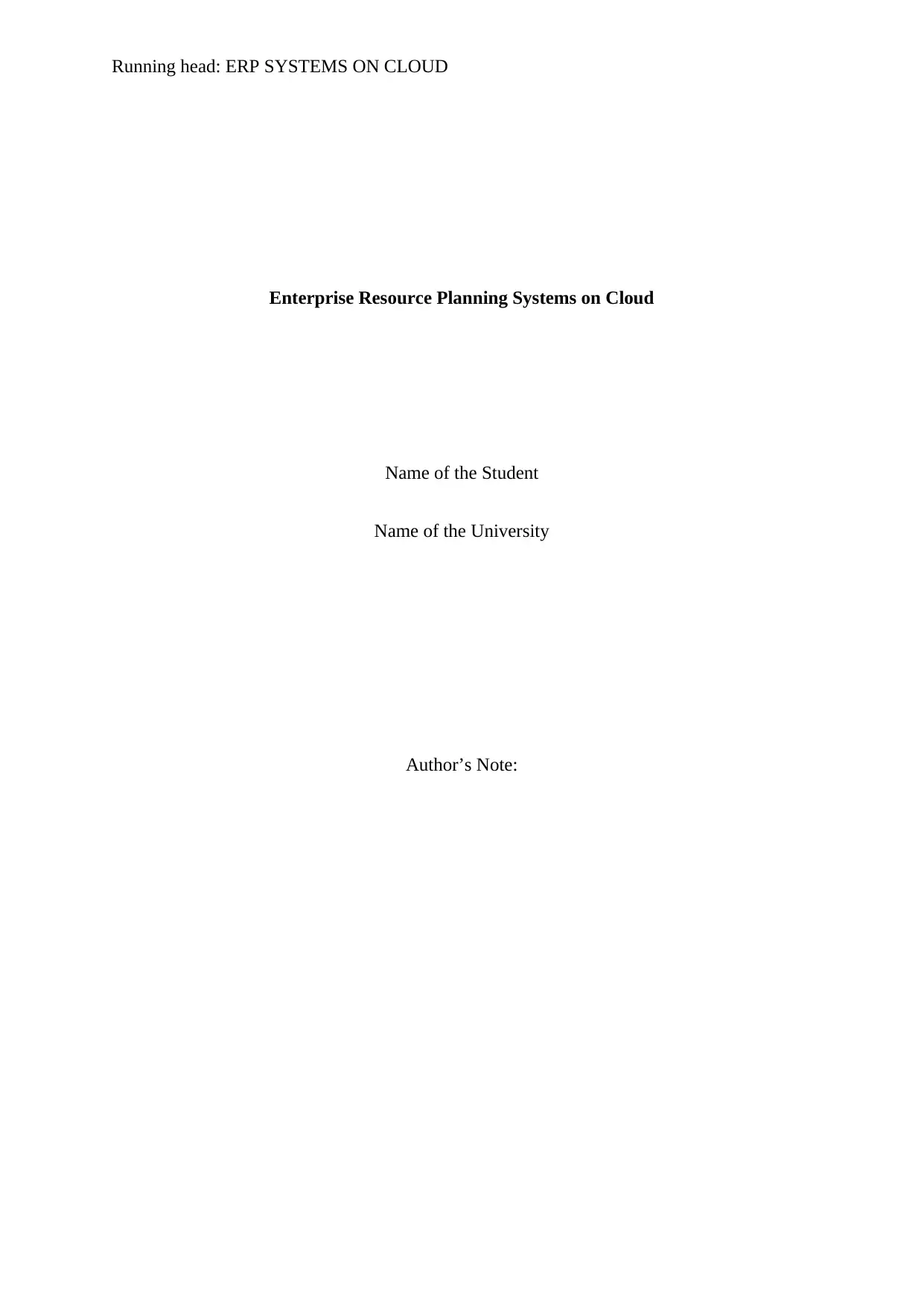
Running head: ERP SYSTEMS ON CLOUD
Enterprise Resource Planning Systems on Cloud
Name of the Student
Name of the University
Author’s Note:
Enterprise Resource Planning Systems on Cloud
Name of the Student
Name of the University
Author’s Note:
Paraphrase This Document
Need a fresh take? Get an instant paraphrase of this document with our AI Paraphraser
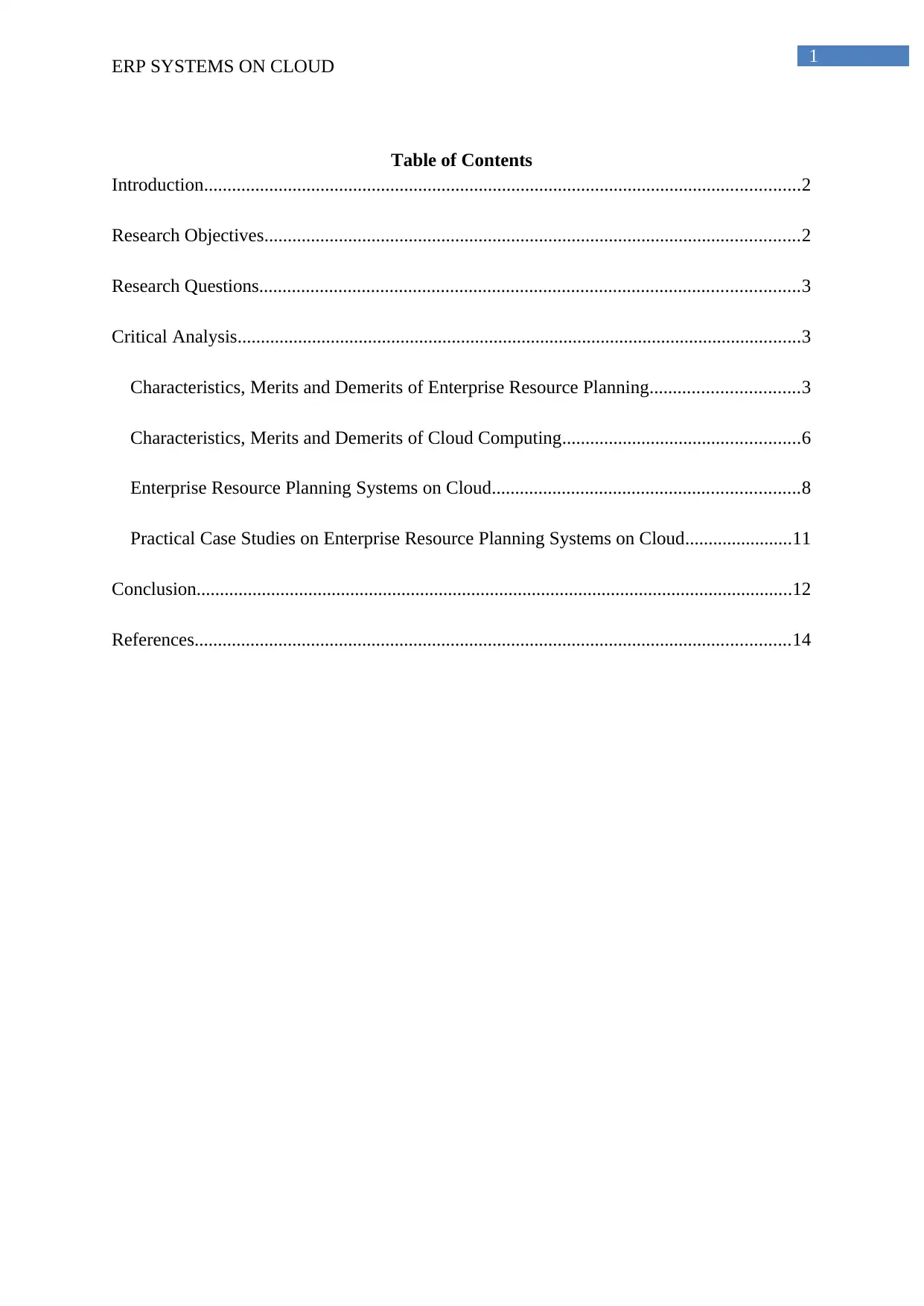
1
ERP SYSTEMS ON CLOUD
Table of Contents
Introduction................................................................................................................................2
Research Objectives...................................................................................................................2
Research Questions....................................................................................................................3
Critical Analysis.........................................................................................................................3
Characteristics, Merits and Demerits of Enterprise Resource Planning................................3
Characteristics, Merits and Demerits of Cloud Computing...................................................6
Enterprise Resource Planning Systems on Cloud..................................................................8
Practical Case Studies on Enterprise Resource Planning Systems on Cloud.......................11
Conclusion................................................................................................................................12
References................................................................................................................................14
ERP SYSTEMS ON CLOUD
Table of Contents
Introduction................................................................................................................................2
Research Objectives...................................................................................................................2
Research Questions....................................................................................................................3
Critical Analysis.........................................................................................................................3
Characteristics, Merits and Demerits of Enterprise Resource Planning................................3
Characteristics, Merits and Demerits of Cloud Computing...................................................6
Enterprise Resource Planning Systems on Cloud..................................................................8
Practical Case Studies on Enterprise Resource Planning Systems on Cloud.......................11
Conclusion................................................................................................................................12
References................................................................................................................................14
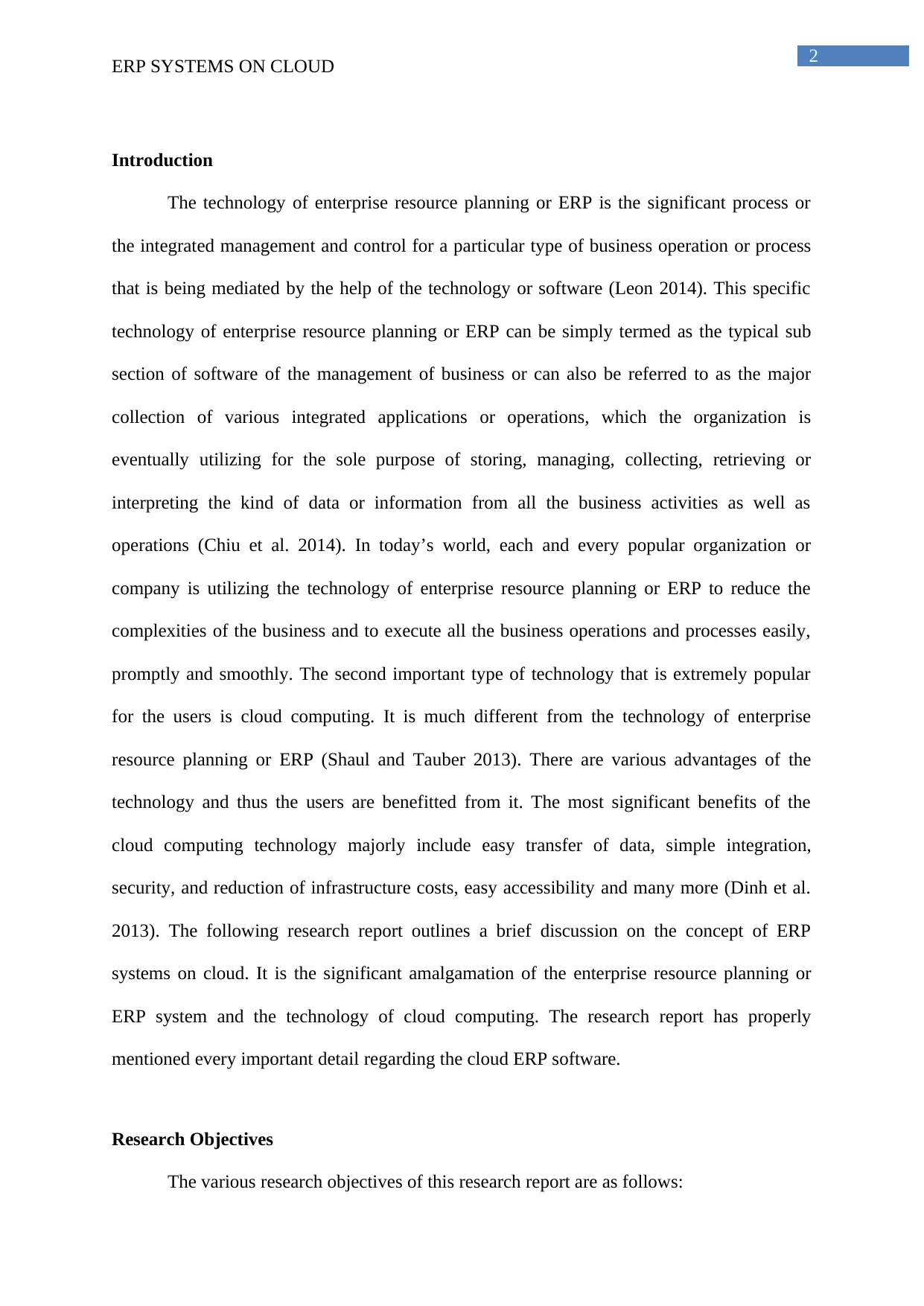
2
ERP SYSTEMS ON CLOUD
Introduction
The technology of enterprise resource planning or ERP is the significant process or
the integrated management and control for a particular type of business operation or process
that is being mediated by the help of the technology or software (Leon 2014). This specific
technology of enterprise resource planning or ERP can be simply termed as the typical sub
section of software of the management of business or can also be referred to as the major
collection of various integrated applications or operations, which the organization is
eventually utilizing for the sole purpose of storing, managing, collecting, retrieving or
interpreting the kind of data or information from all the business activities as well as
operations (Chiu et al. 2014). In today’s world, each and every popular organization or
company is utilizing the technology of enterprise resource planning or ERP to reduce the
complexities of the business and to execute all the business operations and processes easily,
promptly and smoothly. The second important type of technology that is extremely popular
for the users is cloud computing. It is much different from the technology of enterprise
resource planning or ERP (Shaul and Tauber 2013). There are various advantages of the
technology and thus the users are benefitted from it. The most significant benefits of the
cloud computing technology majorly include easy transfer of data, simple integration,
security, and reduction of infrastructure costs, easy accessibility and many more (Dinh et al.
2013). The following research report outlines a brief discussion on the concept of ERP
systems on cloud. It is the significant amalgamation of the enterprise resource planning or
ERP system and the technology of cloud computing. The research report has properly
mentioned every important detail regarding the cloud ERP software.
Research Objectives
The various research objectives of this research report are as follows:
ERP SYSTEMS ON CLOUD
Introduction
The technology of enterprise resource planning or ERP is the significant process or
the integrated management and control for a particular type of business operation or process
that is being mediated by the help of the technology or software (Leon 2014). This specific
technology of enterprise resource planning or ERP can be simply termed as the typical sub
section of software of the management of business or can also be referred to as the major
collection of various integrated applications or operations, which the organization is
eventually utilizing for the sole purpose of storing, managing, collecting, retrieving or
interpreting the kind of data or information from all the business activities as well as
operations (Chiu et al. 2014). In today’s world, each and every popular organization or
company is utilizing the technology of enterprise resource planning or ERP to reduce the
complexities of the business and to execute all the business operations and processes easily,
promptly and smoothly. The second important type of technology that is extremely popular
for the users is cloud computing. It is much different from the technology of enterprise
resource planning or ERP (Shaul and Tauber 2013). There are various advantages of the
technology and thus the users are benefitted from it. The most significant benefits of the
cloud computing technology majorly include easy transfer of data, simple integration,
security, and reduction of infrastructure costs, easy accessibility and many more (Dinh et al.
2013). The following research report outlines a brief discussion on the concept of ERP
systems on cloud. It is the significant amalgamation of the enterprise resource planning or
ERP system and the technology of cloud computing. The research report has properly
mentioned every important detail regarding the cloud ERP software.
Research Objectives
The various research objectives of this research report are as follows:
⊘ This is a preview!⊘
Do you want full access?
Subscribe today to unlock all pages.

Trusted by 1+ million students worldwide
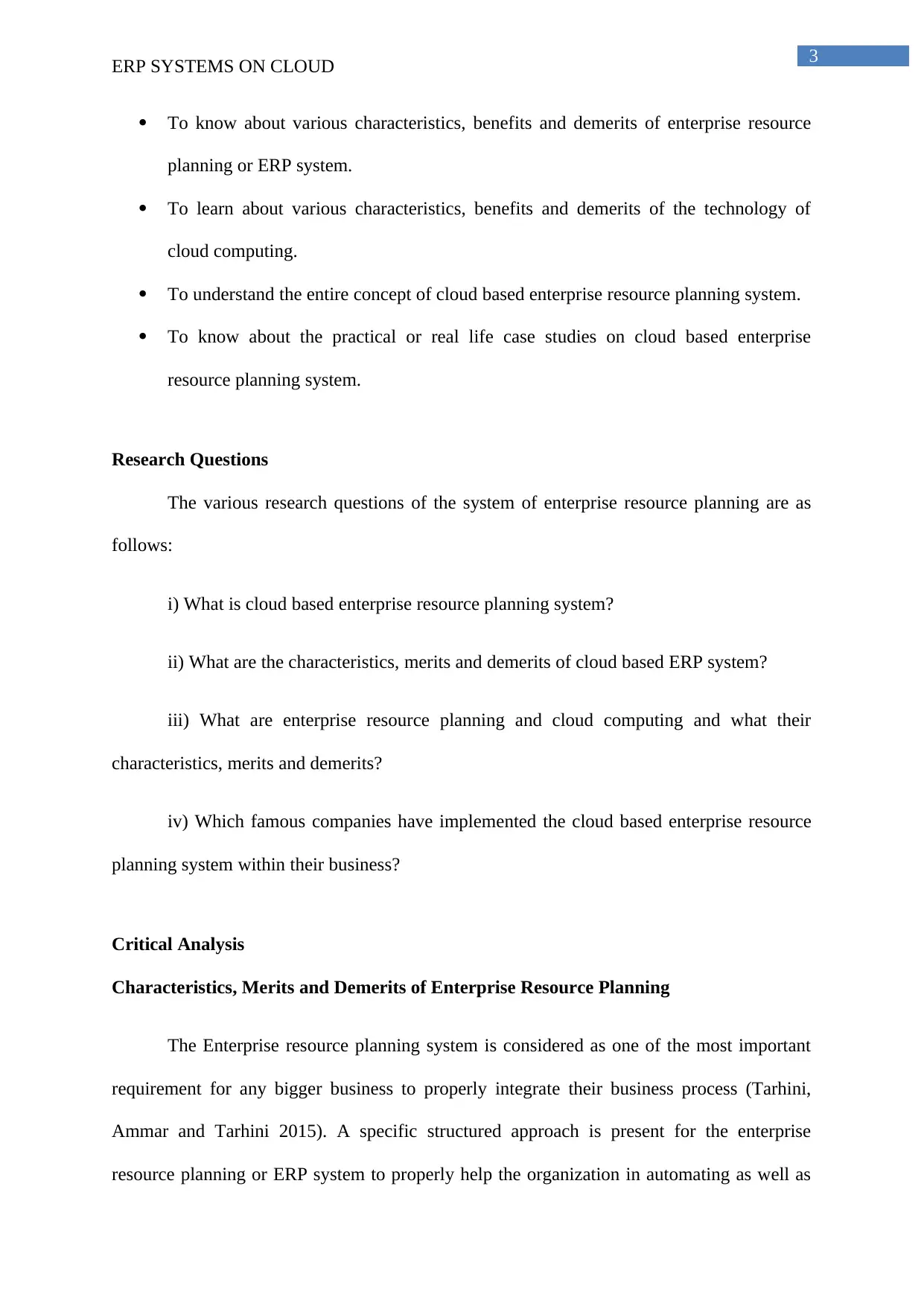
3
ERP SYSTEMS ON CLOUD
To know about various characteristics, benefits and demerits of enterprise resource
planning or ERP system.
To learn about various characteristics, benefits and demerits of the technology of
cloud computing.
To understand the entire concept of cloud based enterprise resource planning system.
To know about the practical or real life case studies on cloud based enterprise
resource planning system.
Research Questions
The various research questions of the system of enterprise resource planning are as
follows:
i) What is cloud based enterprise resource planning system?
ii) What are the characteristics, merits and demerits of cloud based ERP system?
iii) What are enterprise resource planning and cloud computing and what their
characteristics, merits and demerits?
iv) Which famous companies have implemented the cloud based enterprise resource
planning system within their business?
Critical Analysis
Characteristics, Merits and Demerits of Enterprise Resource Planning
The Enterprise resource planning system is considered as one of the most important
requirement for any bigger business to properly integrate their business process (Tarhini,
Ammar and Tarhini 2015). A specific structured approach is present for the enterprise
resource planning or ERP system to properly help the organization in automating as well as
ERP SYSTEMS ON CLOUD
To know about various characteristics, benefits and demerits of enterprise resource
planning or ERP system.
To learn about various characteristics, benefits and demerits of the technology of
cloud computing.
To understand the entire concept of cloud based enterprise resource planning system.
To know about the practical or real life case studies on cloud based enterprise
resource planning system.
Research Questions
The various research questions of the system of enterprise resource planning are as
follows:
i) What is cloud based enterprise resource planning system?
ii) What are the characteristics, merits and demerits of cloud based ERP system?
iii) What are enterprise resource planning and cloud computing and what their
characteristics, merits and demerits?
iv) Which famous companies have implemented the cloud based enterprise resource
planning system within their business?
Critical Analysis
Characteristics, Merits and Demerits of Enterprise Resource Planning
The Enterprise resource planning system is considered as one of the most important
requirement for any bigger business to properly integrate their business process (Tarhini,
Ammar and Tarhini 2015). A specific structured approach is present for the enterprise
resource planning or ERP system to properly help the organization in automating as well as
Paraphrase This Document
Need a fresh take? Get an instant paraphrase of this document with our AI Paraphraser
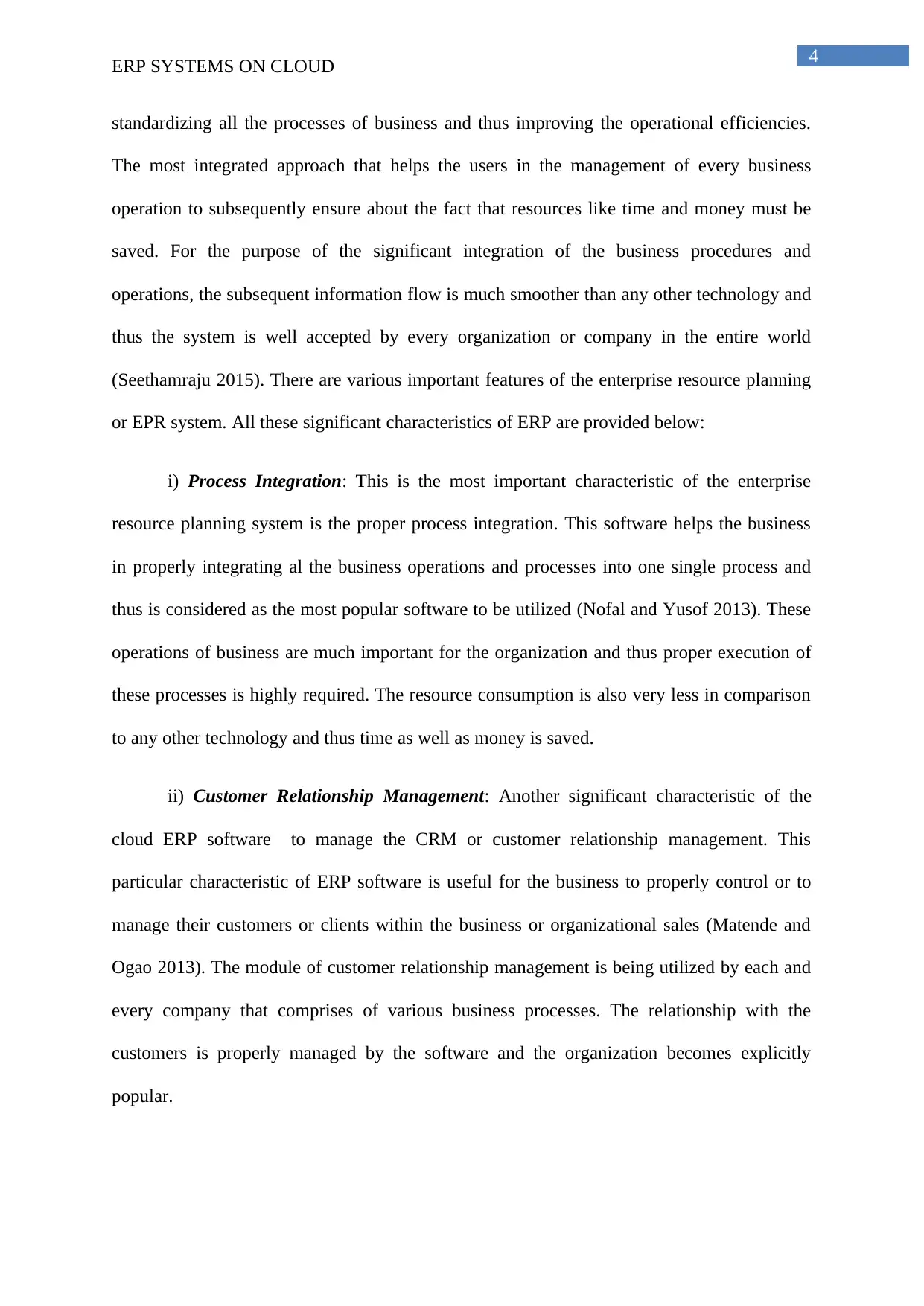
4
ERP SYSTEMS ON CLOUD
standardizing all the processes of business and thus improving the operational efficiencies.
The most integrated approach that helps the users in the management of every business
operation to subsequently ensure about the fact that resources like time and money must be
saved. For the purpose of the significant integration of the business procedures and
operations, the subsequent information flow is much smoother than any other technology and
thus the system is well accepted by every organization or company in the entire world
(Seethamraju 2015). There are various important features of the enterprise resource planning
or EPR system. All these significant characteristics of ERP are provided below:
i) Process Integration: This is the most important characteristic of the enterprise
resource planning system is the proper process integration. This software helps the business
in properly integrating al the business operations and processes into one single process and
thus is considered as the most popular software to be utilized (Nofal and Yusof 2013). These
operations of business are much important for the organization and thus proper execution of
these processes is highly required. The resource consumption is also very less in comparison
to any other technology and thus time as well as money is saved.
ii) Customer Relationship Management: Another significant characteristic of the
cloud ERP software to manage the CRM or customer relationship management. This
particular characteristic of ERP software is useful for the business to properly control or to
manage their customers or clients within the business or organizational sales (Matende and
Ogao 2013). The module of customer relationship management is being utilized by each and
every company that comprises of various business processes. The relationship with the
customers is properly managed by the software and the organization becomes explicitly
popular.
ERP SYSTEMS ON CLOUD
standardizing all the processes of business and thus improving the operational efficiencies.
The most integrated approach that helps the users in the management of every business
operation to subsequently ensure about the fact that resources like time and money must be
saved. For the purpose of the significant integration of the business procedures and
operations, the subsequent information flow is much smoother than any other technology and
thus the system is well accepted by every organization or company in the entire world
(Seethamraju 2015). There are various important features of the enterprise resource planning
or EPR system. All these significant characteristics of ERP are provided below:
i) Process Integration: This is the most important characteristic of the enterprise
resource planning system is the proper process integration. This software helps the business
in properly integrating al the business operations and processes into one single process and
thus is considered as the most popular software to be utilized (Nofal and Yusof 2013). These
operations of business are much important for the organization and thus proper execution of
these processes is highly required. The resource consumption is also very less in comparison
to any other technology and thus time as well as money is saved.
ii) Customer Relationship Management: Another significant characteristic of the
cloud ERP software to manage the CRM or customer relationship management. This
particular characteristic of ERP software is useful for the business to properly control or to
manage their customers or clients within the business or organizational sales (Matende and
Ogao 2013). The module of customer relationship management is being utilized by each and
every company that comprises of various business processes. The relationship with the
customers is properly managed by the software and the organization becomes explicitly
popular.
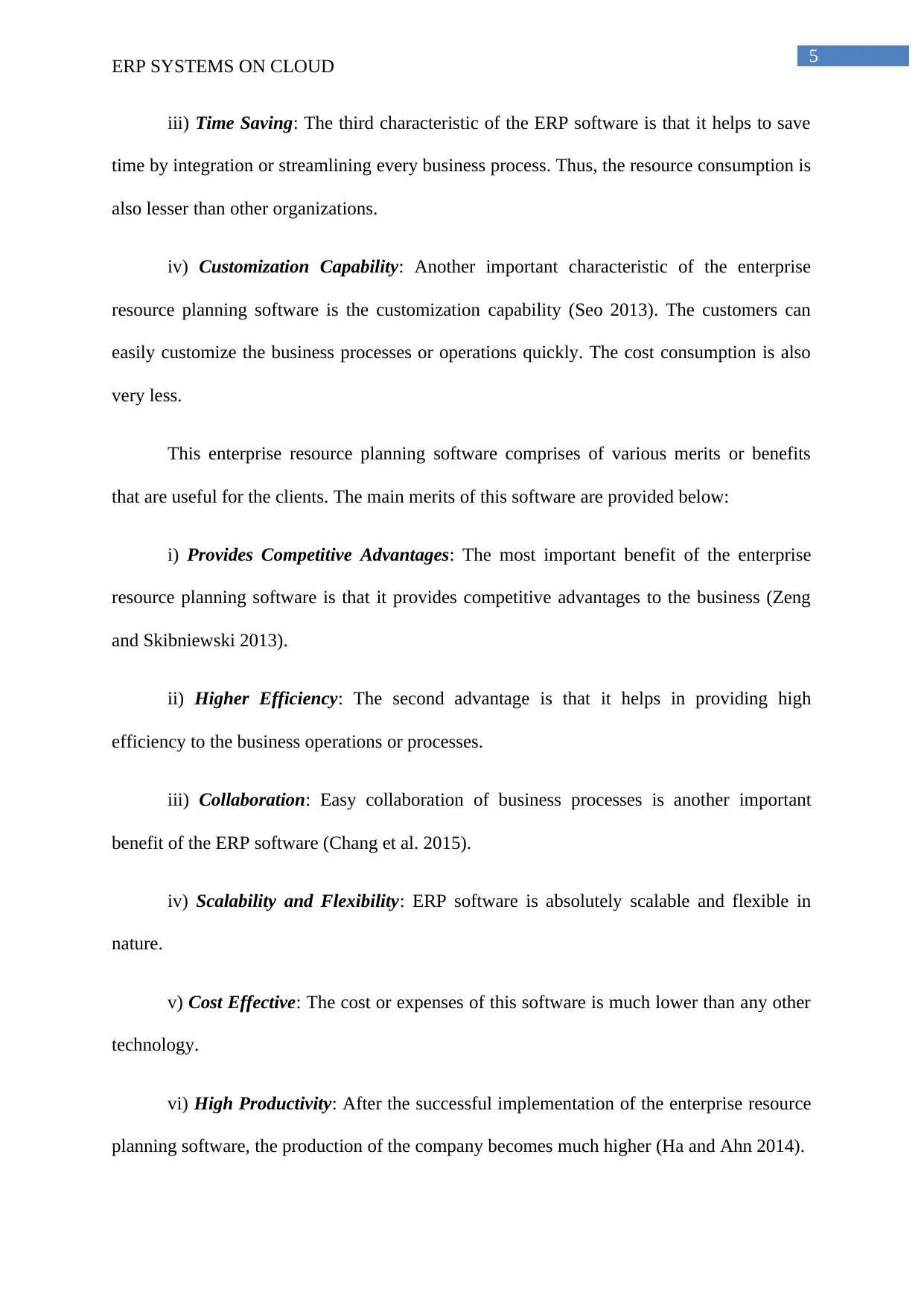
5
ERP SYSTEMS ON CLOUD
iii) Time Saving: The third characteristic of the ERP software is that it helps to save
time by integration or streamlining every business process. Thus, the resource consumption is
also lesser than other organizations.
iv) Customization Capability: Another important characteristic of the enterprise
resource planning software is the customization capability (Seo 2013). The customers can
easily customize the business processes or operations quickly. The cost consumption is also
very less.
This enterprise resource planning software comprises of various merits or benefits
that are useful for the clients. The main merits of this software are provided below:
i) Provides Competitive Advantages: The most important benefit of the enterprise
resource planning software is that it provides competitive advantages to the business (Zeng
and Skibniewski 2013).
ii) Higher Efficiency: The second advantage is that it helps in providing high
efficiency to the business operations or processes.
iii) Collaboration: Easy collaboration of business processes is another important
benefit of the ERP software (Chang et al. 2015).
iv) Scalability and Flexibility: ERP software is absolutely scalable and flexible in
nature.
v) Cost Effective: The cost or expenses of this software is much lower than any other
technology.
vi) High Productivity: After the successful implementation of the enterprise resource
planning software, the production of the company becomes much higher (Ha and Ahn 2014).
ERP SYSTEMS ON CLOUD
iii) Time Saving: The third characteristic of the ERP software is that it helps to save
time by integration or streamlining every business process. Thus, the resource consumption is
also lesser than other organizations.
iv) Customization Capability: Another important characteristic of the enterprise
resource planning software is the customization capability (Seo 2013). The customers can
easily customize the business processes or operations quickly. The cost consumption is also
very less.
This enterprise resource planning software comprises of various merits or benefits
that are useful for the clients. The main merits of this software are provided below:
i) Provides Competitive Advantages: The most important benefit of the enterprise
resource planning software is that it provides competitive advantages to the business (Zeng
and Skibniewski 2013).
ii) Higher Efficiency: The second advantage is that it helps in providing high
efficiency to the business operations or processes.
iii) Collaboration: Easy collaboration of business processes is another important
benefit of the ERP software (Chang et al. 2015).
iv) Scalability and Flexibility: ERP software is absolutely scalable and flexible in
nature.
v) Cost Effective: The cost or expenses of this software is much lower than any other
technology.
vi) High Productivity: After the successful implementation of the enterprise resource
planning software, the production of the company becomes much higher (Ha and Ahn 2014).
⊘ This is a preview!⊘
Do you want full access?
Subscribe today to unlock all pages.

Trusted by 1+ million students worldwide
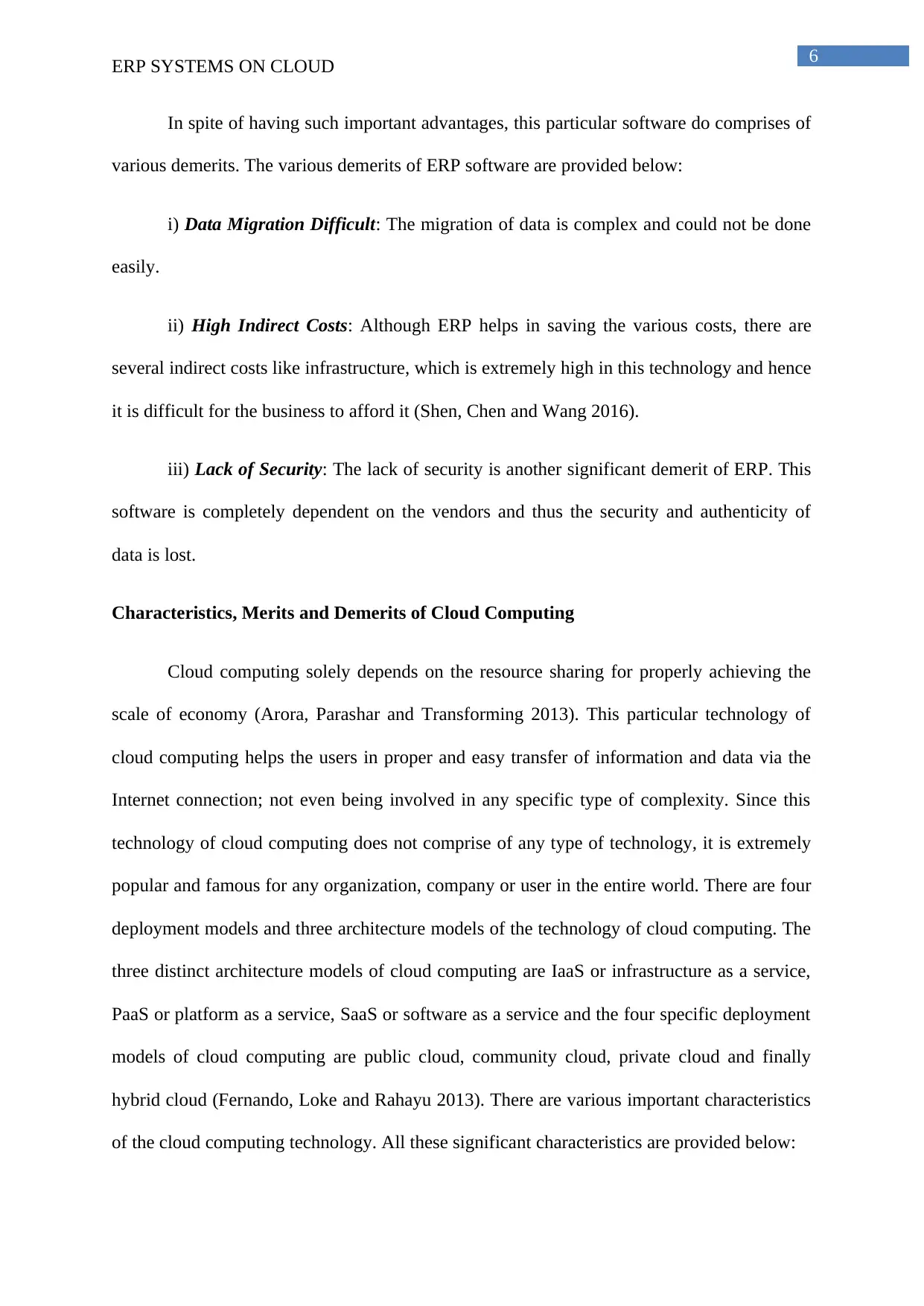
6
ERP SYSTEMS ON CLOUD
In spite of having such important advantages, this particular software do comprises of
various demerits. The various demerits of ERP software are provided below:
i) Data Migration Difficult: The migration of data is complex and could not be done
easily.
ii) High Indirect Costs: Although ERP helps in saving the various costs, there are
several indirect costs like infrastructure, which is extremely high in this technology and hence
it is difficult for the business to afford it (Shen, Chen and Wang 2016).
iii) Lack of Security: The lack of security is another significant demerit of ERP. This
software is completely dependent on the vendors and thus the security and authenticity of
data is lost.
Characteristics, Merits and Demerits of Cloud Computing
Cloud computing solely depends on the resource sharing for properly achieving the
scale of economy (Arora, Parashar and Transforming 2013). This particular technology of
cloud computing helps the users in proper and easy transfer of information and data via the
Internet connection; not even being involved in any specific type of complexity. Since this
technology of cloud computing does not comprise of any type of technology, it is extremely
popular and famous for any organization, company or user in the entire world. There are four
deployment models and three architecture models of the technology of cloud computing. The
three distinct architecture models of cloud computing are IaaS or infrastructure as a service,
PaaS or platform as a service, SaaS or software as a service and the four specific deployment
models of cloud computing are public cloud, community cloud, private cloud and finally
hybrid cloud (Fernando, Loke and Rahayu 2013). There are various important characteristics
of the cloud computing technology. All these significant characteristics are provided below:
ERP SYSTEMS ON CLOUD
In spite of having such important advantages, this particular software do comprises of
various demerits. The various demerits of ERP software are provided below:
i) Data Migration Difficult: The migration of data is complex and could not be done
easily.
ii) High Indirect Costs: Although ERP helps in saving the various costs, there are
several indirect costs like infrastructure, which is extremely high in this technology and hence
it is difficult for the business to afford it (Shen, Chen and Wang 2016).
iii) Lack of Security: The lack of security is another significant demerit of ERP. This
software is completely dependent on the vendors and thus the security and authenticity of
data is lost.
Characteristics, Merits and Demerits of Cloud Computing
Cloud computing solely depends on the resource sharing for properly achieving the
scale of economy (Arora, Parashar and Transforming 2013). This particular technology of
cloud computing helps the users in proper and easy transfer of information and data via the
Internet connection; not even being involved in any specific type of complexity. Since this
technology of cloud computing does not comprise of any type of technology, it is extremely
popular and famous for any organization, company or user in the entire world. There are four
deployment models and three architecture models of the technology of cloud computing. The
three distinct architecture models of cloud computing are IaaS or infrastructure as a service,
PaaS or platform as a service, SaaS or software as a service and the four specific deployment
models of cloud computing are public cloud, community cloud, private cloud and finally
hybrid cloud (Fernando, Loke and Rahayu 2013). There are various important characteristics
of the cloud computing technology. All these significant characteristics are provided below:
Paraphrase This Document
Need a fresh take? Get an instant paraphrase of this document with our AI Paraphraser
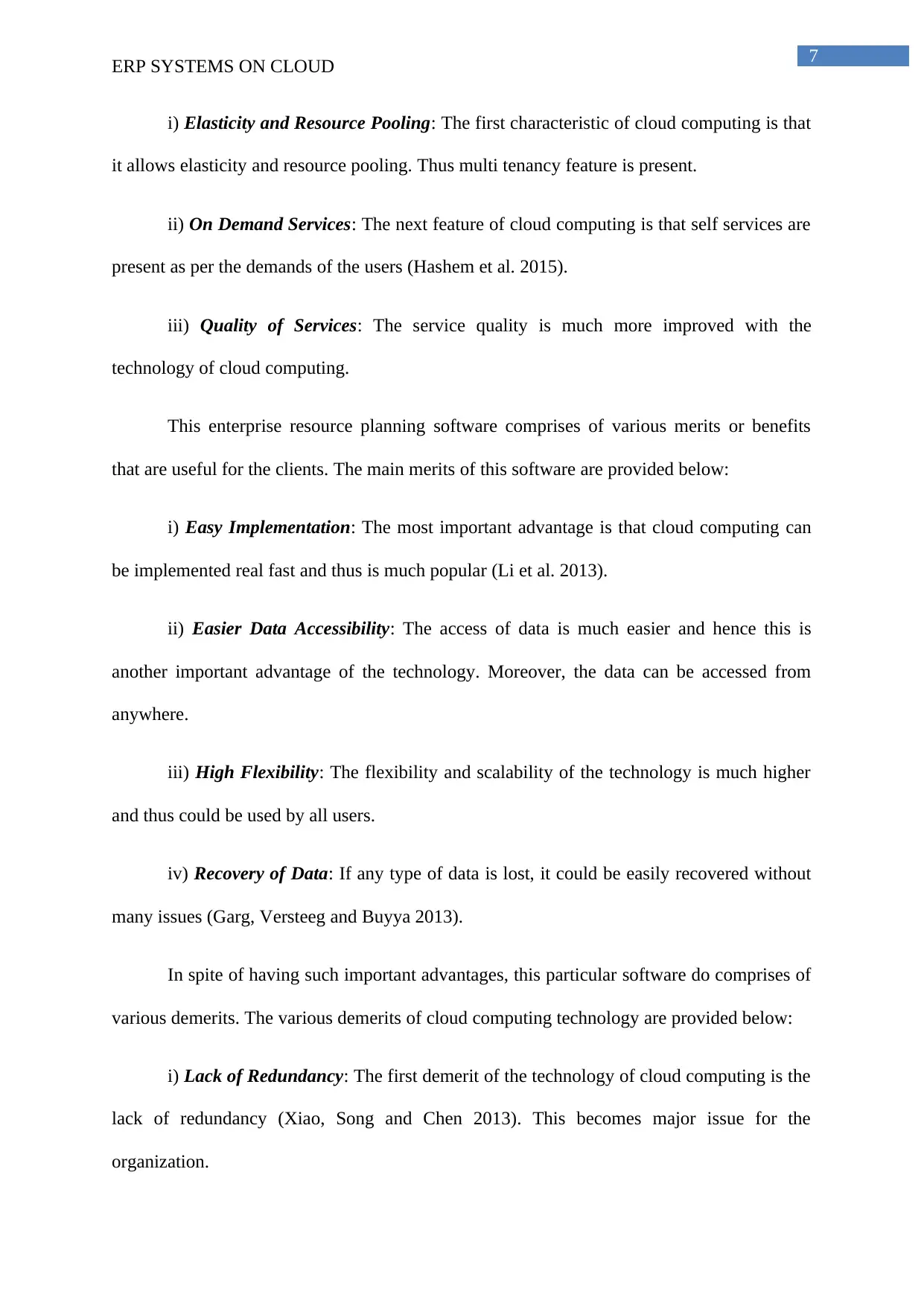
7
ERP SYSTEMS ON CLOUD
i) Elasticity and Resource Pooling: The first characteristic of cloud computing is that
it allows elasticity and resource pooling. Thus multi tenancy feature is present.
ii) On Demand Services: The next feature of cloud computing is that self services are
present as per the demands of the users (Hashem et al. 2015).
iii) Quality of Services: The service quality is much more improved with the
technology of cloud computing.
This enterprise resource planning software comprises of various merits or benefits
that are useful for the clients. The main merits of this software are provided below:
i) Easy Implementation: The most important advantage is that cloud computing can
be implemented real fast and thus is much popular (Li et al. 2013).
ii) Easier Data Accessibility: The access of data is much easier and hence this is
another important advantage of the technology. Moreover, the data can be accessed from
anywhere.
iii) High Flexibility: The flexibility and scalability of the technology is much higher
and thus could be used by all users.
iv) Recovery of Data: If any type of data is lost, it could be easily recovered without
many issues (Garg, Versteeg and Buyya 2013).
In spite of having such important advantages, this particular software do comprises of
various demerits. The various demerits of cloud computing technology are provided below:
i) Lack of Redundancy: The first demerit of the technology of cloud computing is the
lack of redundancy (Xiao, Song and Chen 2013). This becomes major issue for the
organization.
ERP SYSTEMS ON CLOUD
i) Elasticity and Resource Pooling: The first characteristic of cloud computing is that
it allows elasticity and resource pooling. Thus multi tenancy feature is present.
ii) On Demand Services: The next feature of cloud computing is that self services are
present as per the demands of the users (Hashem et al. 2015).
iii) Quality of Services: The service quality is much more improved with the
technology of cloud computing.
This enterprise resource planning software comprises of various merits or benefits
that are useful for the clients. The main merits of this software are provided below:
i) Easy Implementation: The most important advantage is that cloud computing can
be implemented real fast and thus is much popular (Li et al. 2013).
ii) Easier Data Accessibility: The access of data is much easier and hence this is
another important advantage of the technology. Moreover, the data can be accessed from
anywhere.
iii) High Flexibility: The flexibility and scalability of the technology is much higher
and thus could be used by all users.
iv) Recovery of Data: If any type of data is lost, it could be easily recovered without
many issues (Garg, Versteeg and Buyya 2013).
In spite of having such important advantages, this particular software do comprises of
various demerits. The various demerits of cloud computing technology are provided below:
i) Lack of Redundancy: The first demerit of the technology of cloud computing is the
lack of redundancy (Xiao, Song and Chen 2013). This becomes major issue for the
organization.
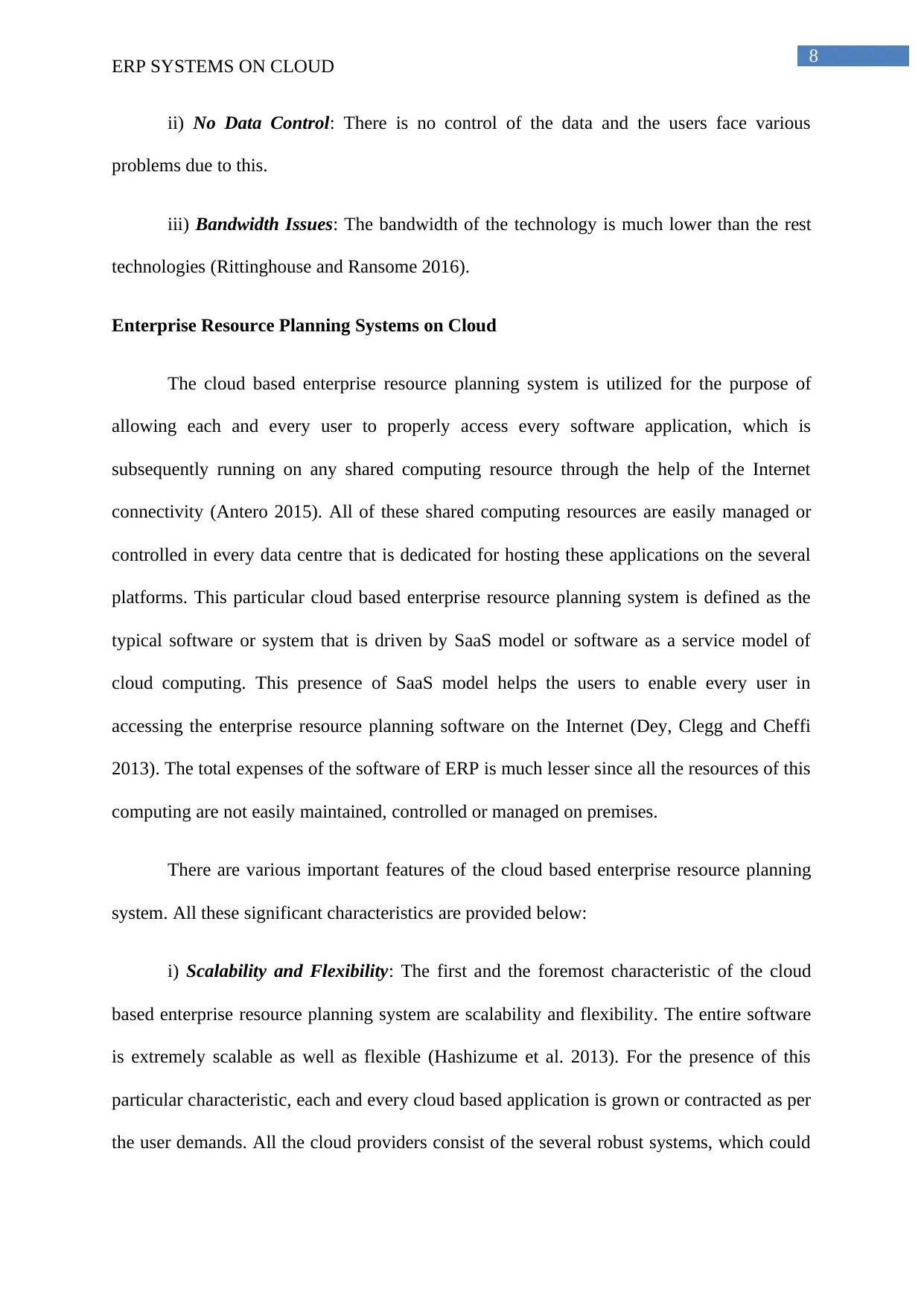
8
ERP SYSTEMS ON CLOUD
ii) No Data Control: There is no control of the data and the users face various
problems due to this.
iii) Bandwidth Issues: The bandwidth of the technology is much lower than the rest
technologies (Rittinghouse and Ransome 2016).
Enterprise Resource Planning Systems on Cloud
The cloud based enterprise resource planning system is utilized for the purpose of
allowing each and every user to properly access every software application, which is
subsequently running on any shared computing resource through the help of the Internet
connectivity (Antero 2015). All of these shared computing resources are easily managed or
controlled in every data centre that is dedicated for hosting these applications on the several
platforms. This particular cloud based enterprise resource planning system is defined as the
typical software or system that is driven by SaaS model or software as a service model of
cloud computing. This presence of SaaS model helps the users to enable every user in
accessing the enterprise resource planning software on the Internet (Dey, Clegg and Cheffi
2013). The total expenses of the software of ERP is much lesser since all the resources of this
computing are not easily maintained, controlled or managed on premises.
There are various important features of the cloud based enterprise resource planning
system. All these significant characteristics are provided below:
i) Scalability and Flexibility: The first and the foremost characteristic of the cloud
based enterprise resource planning system are scalability and flexibility. The entire software
is extremely scalable as well as flexible (Hashizume et al. 2013). For the presence of this
particular characteristic, each and every cloud based application is grown or contracted as per
the user demands. All the cloud providers consist of the several robust systems, which could
ERP SYSTEMS ON CLOUD
ii) No Data Control: There is no control of the data and the users face various
problems due to this.
iii) Bandwidth Issues: The bandwidth of the technology is much lower than the rest
technologies (Rittinghouse and Ransome 2016).
Enterprise Resource Planning Systems on Cloud
The cloud based enterprise resource planning system is utilized for the purpose of
allowing each and every user to properly access every software application, which is
subsequently running on any shared computing resource through the help of the Internet
connectivity (Antero 2015). All of these shared computing resources are easily managed or
controlled in every data centre that is dedicated for hosting these applications on the several
platforms. This particular cloud based enterprise resource planning system is defined as the
typical software or system that is driven by SaaS model or software as a service model of
cloud computing. This presence of SaaS model helps the users to enable every user in
accessing the enterprise resource planning software on the Internet (Dey, Clegg and Cheffi
2013). The total expenses of the software of ERP is much lesser since all the resources of this
computing are not easily maintained, controlled or managed on premises.
There are various important features of the cloud based enterprise resource planning
system. All these significant characteristics are provided below:
i) Scalability and Flexibility: The first and the foremost characteristic of the cloud
based enterprise resource planning system are scalability and flexibility. The entire software
is extremely scalable as well as flexible (Hashizume et al. 2013). For the presence of this
particular characteristic, each and every cloud based application is grown or contracted as per
the user demands. All the cloud providers consist of the several robust systems, which could
⊘ This is a preview!⊘
Do you want full access?
Subscribe today to unlock all pages.

Trusted by 1+ million students worldwide
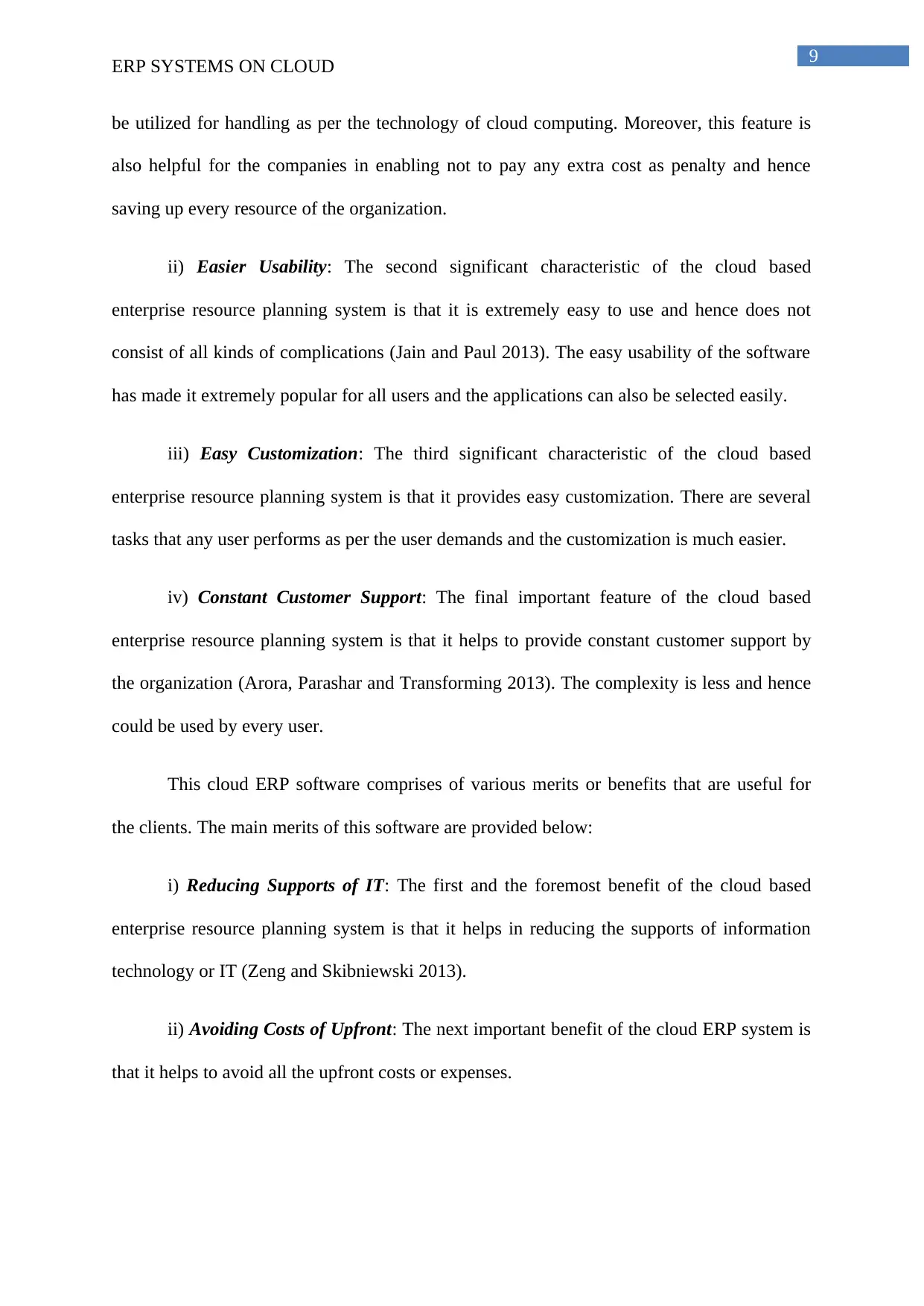
9
ERP SYSTEMS ON CLOUD
be utilized for handling as per the technology of cloud computing. Moreover, this feature is
also helpful for the companies in enabling not to pay any extra cost as penalty and hence
saving up every resource of the organization.
ii) Easier Usability: The second significant characteristic of the cloud based
enterprise resource planning system is that it is extremely easy to use and hence does not
consist of all kinds of complications (Jain and Paul 2013). The easy usability of the software
has made it extremely popular for all users and the applications can also be selected easily.
iii) Easy Customization: The third significant characteristic of the cloud based
enterprise resource planning system is that it provides easy customization. There are several
tasks that any user performs as per the user demands and the customization is much easier.
iv) Constant Customer Support: The final important feature of the cloud based
enterprise resource planning system is that it helps to provide constant customer support by
the organization (Arora, Parashar and Transforming 2013). The complexity is less and hence
could be used by every user.
This cloud ERP software comprises of various merits or benefits that are useful for
the clients. The main merits of this software are provided below:
i) Reducing Supports of IT: The first and the foremost benefit of the cloud based
enterprise resource planning system is that it helps in reducing the supports of information
technology or IT (Zeng and Skibniewski 2013).
ii) Avoiding Costs of Upfront: The next important benefit of the cloud ERP system is
that it helps to avoid all the upfront costs or expenses.
ERP SYSTEMS ON CLOUD
be utilized for handling as per the technology of cloud computing. Moreover, this feature is
also helpful for the companies in enabling not to pay any extra cost as penalty and hence
saving up every resource of the organization.
ii) Easier Usability: The second significant characteristic of the cloud based
enterprise resource planning system is that it is extremely easy to use and hence does not
consist of all kinds of complications (Jain and Paul 2013). The easy usability of the software
has made it extremely popular for all users and the applications can also be selected easily.
iii) Easy Customization: The third significant characteristic of the cloud based
enterprise resource planning system is that it provides easy customization. There are several
tasks that any user performs as per the user demands and the customization is much easier.
iv) Constant Customer Support: The final important feature of the cloud based
enterprise resource planning system is that it helps to provide constant customer support by
the organization (Arora, Parashar and Transforming 2013). The complexity is less and hence
could be used by every user.
This cloud ERP software comprises of various merits or benefits that are useful for
the clients. The main merits of this software are provided below:
i) Reducing Supports of IT: The first and the foremost benefit of the cloud based
enterprise resource planning system is that it helps in reducing the supports of information
technology or IT (Zeng and Skibniewski 2013).
ii) Avoiding Costs of Upfront: The next important benefit of the cloud ERP system is
that it helps to avoid all the upfront costs or expenses.
Paraphrase This Document
Need a fresh take? Get an instant paraphrase of this document with our AI Paraphraser
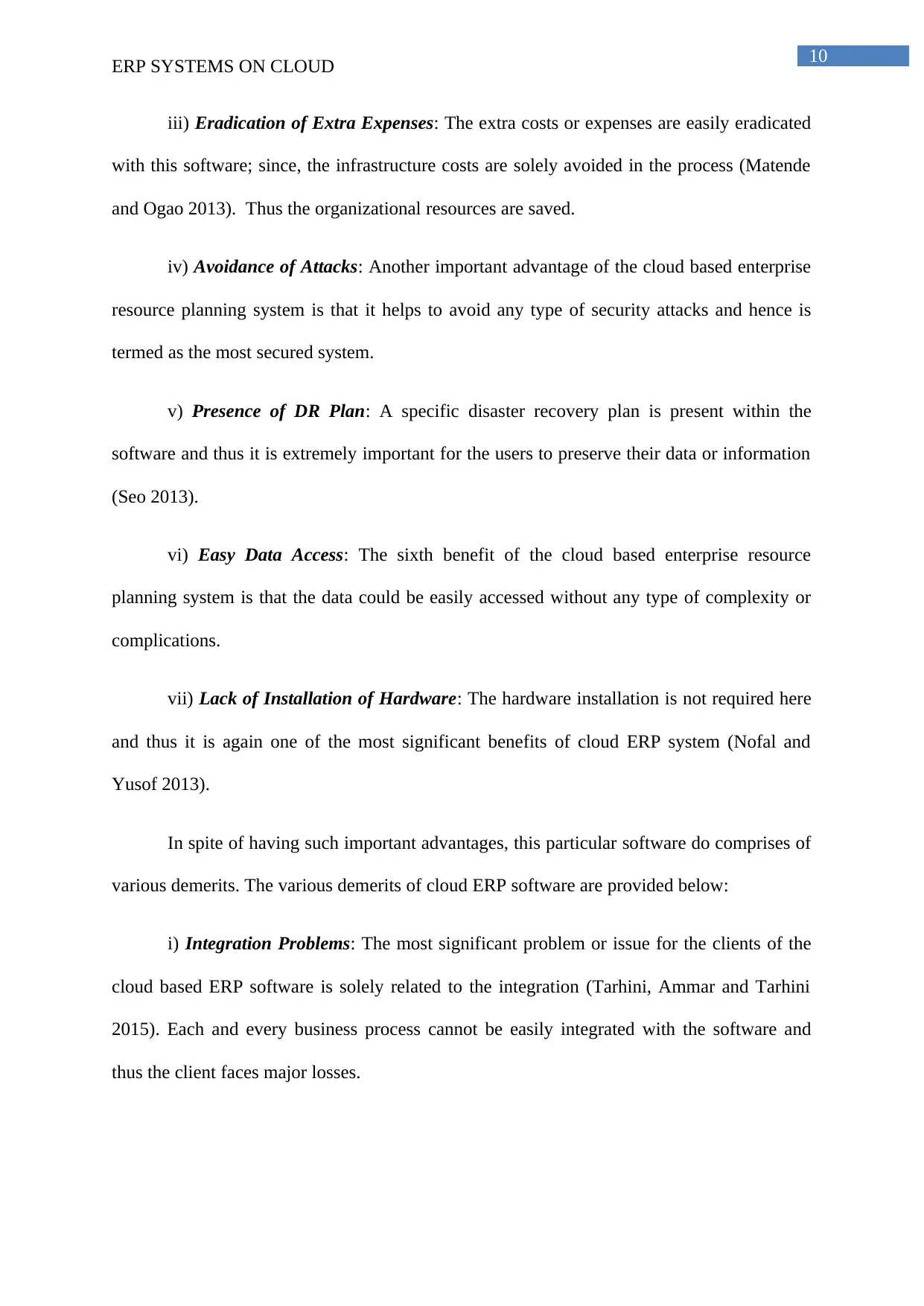
10
ERP SYSTEMS ON CLOUD
iii) Eradication of Extra Expenses: The extra costs or expenses are easily eradicated
with this software; since, the infrastructure costs are solely avoided in the process (Matende
and Ogao 2013). Thus the organizational resources are saved.
iv) Avoidance of Attacks: Another important advantage of the cloud based enterprise
resource planning system is that it helps to avoid any type of security attacks and hence is
termed as the most secured system.
v) Presence of DR Plan: A specific disaster recovery plan is present within the
software and thus it is extremely important for the users to preserve their data or information
(Seo 2013).
vi) Easy Data Access: The sixth benefit of the cloud based enterprise resource
planning system is that the data could be easily accessed without any type of complexity or
complications.
vii) Lack of Installation of Hardware: The hardware installation is not required here
and thus it is again one of the most significant benefits of cloud ERP system (Nofal and
Yusof 2013).
In spite of having such important advantages, this particular software do comprises of
various demerits. The various demerits of cloud ERP software are provided below:
i) Integration Problems: The most significant problem or issue for the clients of the
cloud based ERP software is solely related to the integration (Tarhini, Ammar and Tarhini
2015). Each and every business process cannot be easily integrated with the software and
thus the client faces major losses.
ERP SYSTEMS ON CLOUD
iii) Eradication of Extra Expenses: The extra costs or expenses are easily eradicated
with this software; since, the infrastructure costs are solely avoided in the process (Matende
and Ogao 2013). Thus the organizational resources are saved.
iv) Avoidance of Attacks: Another important advantage of the cloud based enterprise
resource planning system is that it helps to avoid any type of security attacks and hence is
termed as the most secured system.
v) Presence of DR Plan: A specific disaster recovery plan is present within the
software and thus it is extremely important for the users to preserve their data or information
(Seo 2013).
vi) Easy Data Access: The sixth benefit of the cloud based enterprise resource
planning system is that the data could be easily accessed without any type of complexity or
complications.
vii) Lack of Installation of Hardware: The hardware installation is not required here
and thus it is again one of the most significant benefits of cloud ERP system (Nofal and
Yusof 2013).
In spite of having such important advantages, this particular software do comprises of
various demerits. The various demerits of cloud ERP software are provided below:
i) Integration Problems: The most significant problem or issue for the clients of the
cloud based ERP software is solely related to the integration (Tarhini, Ammar and Tarhini
2015). Each and every business process cannot be easily integrated with the software and
thus the client faces major losses.
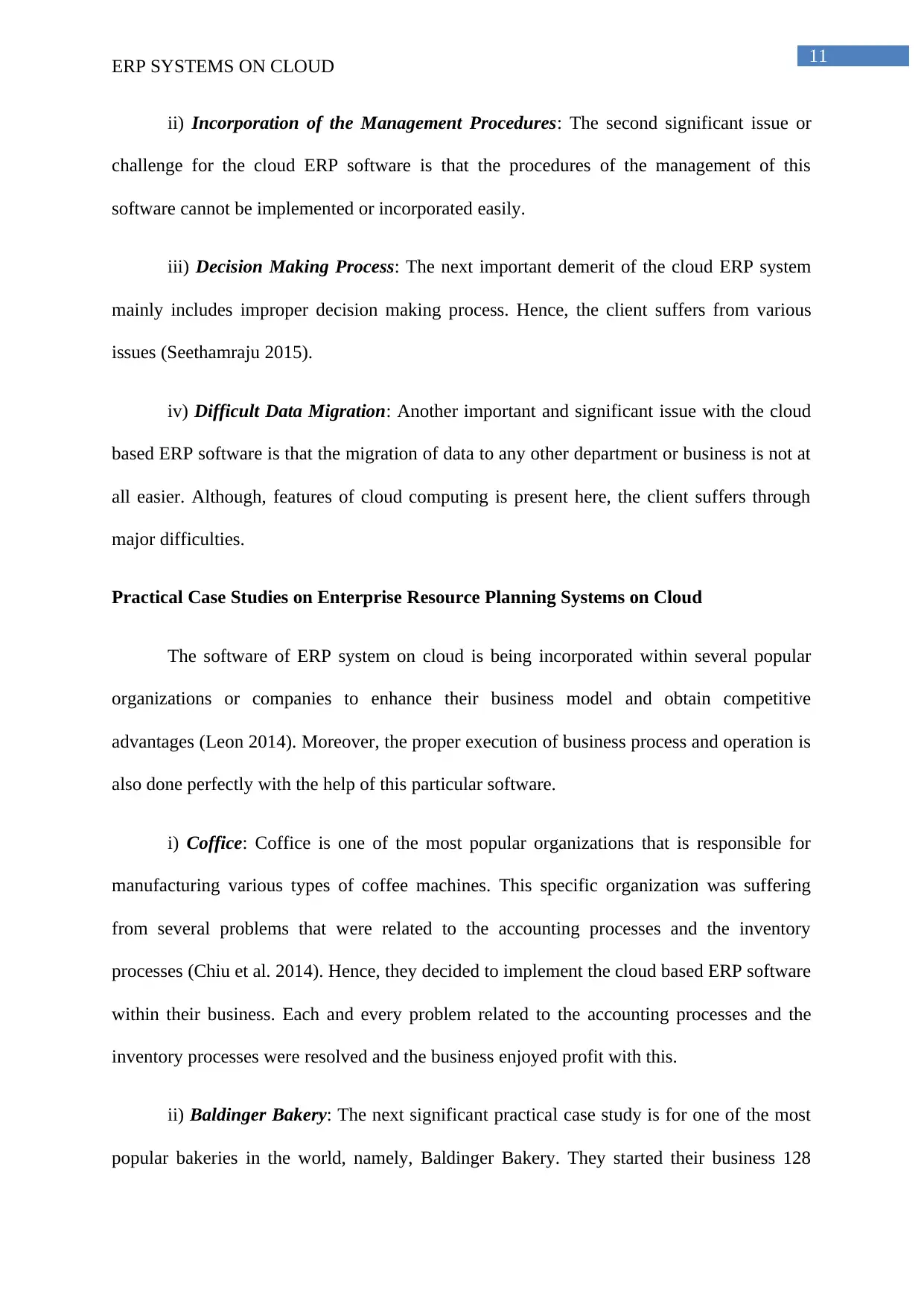
11
ERP SYSTEMS ON CLOUD
ii) Incorporation of the Management Procedures: The second significant issue or
challenge for the cloud ERP software is that the procedures of the management of this
software cannot be implemented or incorporated easily.
iii) Decision Making Process: The next important demerit of the cloud ERP system
mainly includes improper decision making process. Hence, the client suffers from various
issues (Seethamraju 2015).
iv) Difficult Data Migration: Another important and significant issue with the cloud
based ERP software is that the migration of data to any other department or business is not at
all easier. Although, features of cloud computing is present here, the client suffers through
major difficulties.
Practical Case Studies on Enterprise Resource Planning Systems on Cloud
The software of ERP system on cloud is being incorporated within several popular
organizations or companies to enhance their business model and obtain competitive
advantages (Leon 2014). Moreover, the proper execution of business process and operation is
also done perfectly with the help of this particular software.
i) Coffice: Coffice is one of the most popular organizations that is responsible for
manufacturing various types of coffee machines. This specific organization was suffering
from several problems that were related to the accounting processes and the inventory
processes (Chiu et al. 2014). Hence, they decided to implement the cloud based ERP software
within their business. Each and every problem related to the accounting processes and the
inventory processes were resolved and the business enjoyed profit with this.
ii) Baldinger Bakery: The next significant practical case study is for one of the most
popular bakeries in the world, namely, Baldinger Bakery. They started their business 128
ERP SYSTEMS ON CLOUD
ii) Incorporation of the Management Procedures: The second significant issue or
challenge for the cloud ERP software is that the procedures of the management of this
software cannot be implemented or incorporated easily.
iii) Decision Making Process: The next important demerit of the cloud ERP system
mainly includes improper decision making process. Hence, the client suffers from various
issues (Seethamraju 2015).
iv) Difficult Data Migration: Another important and significant issue with the cloud
based ERP software is that the migration of data to any other department or business is not at
all easier. Although, features of cloud computing is present here, the client suffers through
major difficulties.
Practical Case Studies on Enterprise Resource Planning Systems on Cloud
The software of ERP system on cloud is being incorporated within several popular
organizations or companies to enhance their business model and obtain competitive
advantages (Leon 2014). Moreover, the proper execution of business process and operation is
also done perfectly with the help of this particular software.
i) Coffice: Coffice is one of the most popular organizations that is responsible for
manufacturing various types of coffee machines. This specific organization was suffering
from several problems that were related to the accounting processes and the inventory
processes (Chiu et al. 2014). Hence, they decided to implement the cloud based ERP software
within their business. Each and every problem related to the accounting processes and the
inventory processes were resolved and the business enjoyed profit with this.
ii) Baldinger Bakery: The next significant practical case study is for one of the most
popular bakeries in the world, namely, Baldinger Bakery. They started their business 128
⊘ This is a preview!⊘
Do you want full access?
Subscribe today to unlock all pages.

Trusted by 1+ million students worldwide
1 out of 17
Related Documents
Your All-in-One AI-Powered Toolkit for Academic Success.
+13062052269
info@desklib.com
Available 24*7 on WhatsApp / Email
![[object Object]](/_next/static/media/star-bottom.7253800d.svg)
Unlock your academic potential
Copyright © 2020–2026 A2Z Services. All Rights Reserved. Developed and managed by ZUCOL.




